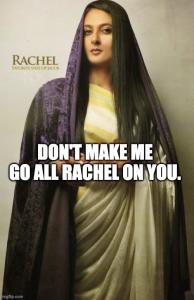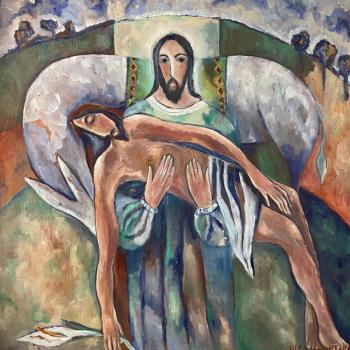30 When Rachel saw that she bore Jacob no children, she envied her sister; and she said to Jacob, “Give me children, or I shall die!” 2 Jacob became very angry with Rachel and said, “Am I in the place of God, who has withheld from you the fruit of the womb?” 3 Then she said, “Here is my maid Bilhah; go in to her, that she may bear upon my knees and that I too may have children through her.” 4 So she gave him her maid Bilhah as a wife; and Jacob went in to her. 5 And Bilhah conceived and bore Jacob a son. 6 Then Rachel said, “God has judged me, and has also heard my voice and given me a son”; therefore she named him Dan. 7 Rachel’s maid Bilhah conceived again and bore Jacob a second son. 8 Then Rachel said, “With mighty wrestlings I have wrestled with my sister, and have prevailed”; so she named him Naphtali.
9 When Leah saw that she had ceased bearing children, she took her maid Zilpah and gave her to Jacob as a wife. 10 Then Leah’s maid Zilpah bore Jacob a son. 11 And Leah said, “Good fortune!” so she named him Gad. 12 Leah’s maid Zilpah bore Jacob a second son. 13 And Leah said, “Happy am I! For the women will call me happy”; so she named him Asher.
14 In the days of wheat harvest Reuben went and found mandrakes in the field, and brought them to his mother Leah. Then Rachel said to Leah, “Please give me some of your son’s mandrakes.” 15 But she said to her, “Is it a small matter that you have taken away my husband? Would you take away my son’s mandrakes also?” Rachel said, “Then he may lie with you tonight for your son’s mandrakes.” 16 When Jacob came from the field in the evening, Leah went out to meet him, and said, “You must come in to me; for I have hired you with my son’s mandrakes.” So he lay with her that night. 17 And God heeded Leah, and she conceived and bore Jacob a fifth son. 18 Leah said, “God has given me my hire because I gave my maid to my husband”; so she named him Issachar. 19 And Leah conceived again, and she bore Jacob a sixth son. 20 Then Leah said, “God has endowed me with a good dowry; now my husband will honorf me, because I have borne him six sons”; so she named him Zebulun. 21 Afterwards she bore a daughter, and named her Dinah.
22 Then God remembered Rachel, and God heeded her and opened her womb. 23 She conceived and bore a son, and said, “God has taken away my reproach” (Ge 30:1-22)
I confess that almost any movie or television show featuring the mountains of Montana automatically has my attention. So, Taylor Sheridan’s “Yellowstone” was an easy sell for me. For those of you who have missed it, Yellowstone is an “American neo-Western drama” following the fortunes of the Dutton family, the Yellowstone ranch, the adjacent Broken Rock Reservation, and a particulary malicious, money hungry succession of land developers.
There isn’t a single character in the entire story that is remotely – shall we say – uncomplicated.
John Dutton is the patriarch of his family and between Dutton and his ranch hand, Rip Wheeler, there is more than enough skullduggery. But for many viewers, the character that has surfaced more forcibly than anyone else is John’s only daughter, Beth.
A cutthroat businesswoman who is not adverse to destroying companies, careers, and people she is fiercely loyal, protective of her father, and determined to protect his ranch at all costs, even though she has no interest in ranch life. Hence, the meme that has made the rounds on social media and t-shirts, “Don’t make me go all Beth Dutton on you” — and my variation on it, “Don’t make me go all Rachel on you”, which is the title of this sermon.
Rachel may not have Beth’s MO but she certainly is one of Scripture’s forceful figures. And she is nothing if not fiercely loyal to her children, protective of her place as Jacob’s wife, and determined to ensure that she and Jacob have children who will secure the future of their family.
Thanks to Rachel’s father, Laban, achieving those goals was never going to be an easy thing to do. As the story goes, Jacob worked for Laban for seven years in order to take Rachel as his wife. And when the time came, Laban insisted that he take Rachel’s older sister first. So, Jacob ended up working another seven years to marry Rachel.
Did Jacob think that he could “pull one over” Laban? Did love blind Jacob to the tradition that Leah had to be married first? Did Laban trick Jacob by suggesting that he would marry off Leah or ignore the requirement that the older daughter be married first? The text doesn’t say.
The ancient rabbis struggled with what actually happened. Some suggested that Rachel told Jacob, the trickster, that he would never outsmart her father. (Something that all future sons-in-law should bear in mind!) And that Rachel and Jacob worked out a series of secret signals that would let Jacob know – even in the dark on their wedding night – that it was her.
The same rabbis went on to suggest that when the time came, Rachel couldn’t bring herself to shame her sister, so she told Leah what the signals were – which is why Jacob was none the wiser until the following morning. If that’s the case – and the rabbis’ explanation seems to be as good as any – then Jacob the trickster met his match in both Laban and Rachel. “What goes around comes around”.
Whatever the case, it was this dynamic that set the stage for the events in the first half of Genesis, chapter 30. Since Jacob married Leah first, she inevitably had children long before Rachel did. And whether she had facilitated Leah’s marriage to Jacob or not, that fact and the children Leah had given Jacob were a sore spot for Rachel. The text is explicit: “When Rachel saw that she bore Jacob no children, she envied her sister…” (vs1).
The Hebrew behind the English is telling. The form of the verb, “envied”, requires an object – and Leah is squarely in Rachel’s sights. We all fall into the habit of thinking that spiritual peril is in a class all its own. Until the decade of 1970s, in fact, there was very little candid conversation about the way that our emotions and relationships undermine our spiritual lives. But they do and because we are all one thing – body, mind, emotions, and spirit – what we give ourselves to emotionally has the power to completely subvert our well-being in every way imaginable. And so it is with envy.
But, of course, we didn’t discover its power in the late twentieth century. We lost track of what ancient church fathers and mothers already knew. Cyprian of Carthage wrote in the third century:
Whoever you are that are envious and malignant, observe how crafty, mischievous, and hateful you are to those whom you hate. Yet you are the enemy of no one’s well-being more than your own. … Wherever you may be, your adversary is with you; your enemy is always in your own breast; your mischief is shut up within; you are tied and bound with the links of chains from which you cannot extricate yourself; you are captive under the tyranny of jealousy; nor will any consolations help you.
Dominated by envy, Rachel cries out – to Jacob, not God! – “Give me children, or I shall die!” And Jacob instantly identifies the problem with Rachel’s appeal. She has effectively prayed for something that no human being – even the people that love us the most can do. And he replies, “Am I in the place of God, who has withheld from you the fruit of your womb?” (vs 2)
Walking with Rachel through the dark night of her soul, it is worth pausing long enough to note that there is another lesson here for of all of us. There are challenges in life that no other human being can address – touching on our sense of self-worth, the experience of grief, the anguish that comes with disappointment. And when we burden our spouses with the task of solving those problems for us, we burden them and our relationship.
The grief can be, literally, unbearable. It is one thing to walk with another person. To hear their sorrow. To do what we can to comfort them along the way.
But for our own spiritual and emotional well-being and the well-being of our relationships, it is important to realize that some problems only God can address. Recognizing that fact and giving God time to heal us is the only thing that can sometimes make space for God to act.
Of course, Rachel does not do that. She not only begs Jacob to give her something that he cannot give her. Then – instead of waiting on God – she engineers her own solution to the problem, and she tells Jacob, “Here is my maid Bilhah”, sleep with her and she will have my baby. (vs 3)
Predictably, this scheme only sharpens Leah’s own sense of jealousy, and when Bilhah has not just one but two children with Jacob (vss 4-8), Leah – out of her own hurt and jealousy – responds in kind. And she gives her maid, Zilpah, to Jacob, who has still another child. (vss 9-13)
But Rachel isn’t done scheming to solve her own problem and she negotiates with Leah to obtain a fruit or “mandrakes” that one of Leah’s sons has harvested that she thinks will address her infertility. (vss 14-16) In exchange she allows Leah to sleep with Jacob again and to make matters worse Leah has two more sons and a daughter. (vss 17-21)
By this point, Yellowstone seems almost tame.
Through it all, the story is one of envy and conflict. Both sets of children are given names that echo the conflict. A daughter is born who seems almost an afterthought, thanks to the conflict and cultural assumptions of the day.
And then, when we have almost forgotten that Rachel’s original plea to Jacob must have sounded like a prayer to God, Rachel conceives. As Genesis notes, “Then God remembered Rachel, and God heeded her and opened her womb. She conceived and bore a son and Rachel said, “God has taken away my reproach,” and she named him Joseph.” (vss 22-24)
What are we to make of this last chapter in Rachel’s story? As one of my friends notes, “If you want to make God laugh, tell him your plans.” But an even better rendering of that bit of wisdom is this: “If you want to make God laugh, tell him you are doing the planning.”
One of the most powerful features of the Book of Genesis is the way that certain themes appear, again and again. And in the story of Rachel, Leah, and Jacob, we confront the truths that are underlined in the story of Adam and Eve in Genesis 3: Like them, we were already made to share in God’s image. But all too often, we act like we are God. We act like we know better, that we can do better. So, when we hatch our schemes for doing what we think God should do and when God should do it, things go sideways. Misery ensues. Conflict grows. We blame one another. And we hurt one another.
But inspite of our choices, God will do what only God can do. Ironically, the children that Rachel, Leah, Jacob, and all their servants have makeup what will prove to be the patriarchs of all twelve tribes of Israel. And God’s promise to bring healing to humankind will be worked out first through them and through Jesus, whose family history stretches back to them.
Could that history have unfurled in another way? Of course. Could it have been marked by less less deceit and conflict? Of course. Those dynamics are entirely the work of broken people and the message of Genesis is that our desire to be our own gods is, in one way or another, at the heart of almost everything that goes awry in our lives.
If there is a fundamental difference between Yellowstone and the story of Rachel, Jacob, and Leah, it is that in Yellowstone, God is absent from the story and in the Old Testament, he is not. Beth works in a moral vacuum where the future she fiercely protects ends in nothing more than more bloodshed. By contrast, on the other side of Rachel’s scheming is the work of God – which transcends what she can imagine and accomplish, the good that God does is not thanks to what Rachel does but to the triumph of God’s grace over what she does.
The message of Genesis to us is not, here is the story of a perfect woman. Follow her. Go all Rachel on life. The message is, here is a woman driven by passions and goals that take her far from God’s will, only to end up witnessing to the goodness and power of God. We can take the long and painful journey she did to discover that truth. Or we can embrace it from wherever we find ourselves on that journey —- now.














